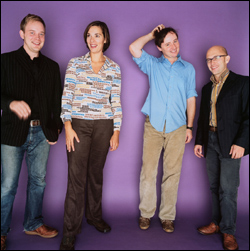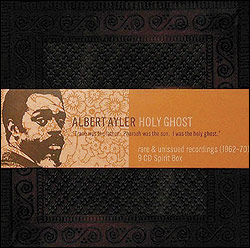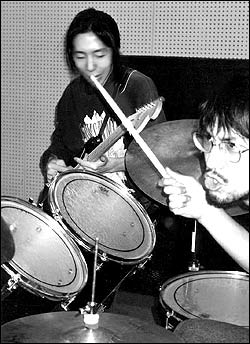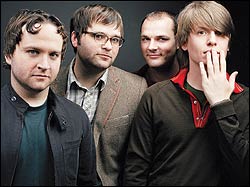In 1940, the composer Olivier Messiaen wrote in his notes for his “Quartet for the End of Time”: “In my dreams, I hear recognized chords and melodies, I see known colors and forms; then, after this transitory stage, I pass beyond reality and submit in ecstasy to a dizziness, a gyratory interlocking of superhuman sounds and colours. These swords of fire, these flows of blue-orange lava, these sudden stars; this is the tumult of rainbows!”
Sixty-three years later, ” . . . sudden stars” became the title of the single from Stereolab’s Margerine Eclipse (Elektra). Messiaen is a favorite of bandleader and guitarist Tim Gane’s, and his fantasy is a pretty good description of their goals as a band—the pursuit of some kind of more-vivid-than-life Technicolor experiential essence through sound. Gane claims, though, that he didn’t get the title from Messiaen: “It was something I wrote down a year or two ago on a piece of paper, full of words I liked.”
As it turns out, the song itself had a complicated genesis. Gane explains that it started out as a melody inspired by the rhythm of Miles Davis’ “Solea,” juxtaposed with a couple of other pieces of music that he’d written over the past 10 years or so and documented on cassettes. “I’m not really a songwriter,” says Gane. “I don’t sit around strumming guitar or playing piano—I never play instruments unless I’m in a studio or playing live. I’m interested in ideas, and using studios and instruments to try to make them real.”
Margerine Eclipse is a pop album in practice, but it was made as process music, “recorded in dual mono.” Stereolab recorded two versions of every song on it, with different arrangements, then synchronized them on a computer: one in the left speaker, one in the right speaker. “Obstacles and puzzles always open up what to do to try to get around them,” Gane says. “I always try to set up a new way of thinking about the music before we record. If we carried on recording the same way, I’d think we were guilty of what people say, that it always sounds the same.” (Which is true—any two consecutive Stereolab albums tend to sound almost identical, in practice, although striking differences are apparent at a distance of more than one album.) “But people say that when they hear Laetitia’s voice; that makes it much more like Stereolab.”
Laetitia Sadier’s elegant coo is Stereolab’s signature sound, even more than the bubbling analog keyboards they’ve built their arrangements around since they formed in 1991. She’s also the group’s lyricist (she records her own music under the name Monade) and the source of the earthly specificity that underpins the music’s lush blue-orange lava and tumult of rainbows. Gane told the British newspaper The Independent last year that he’s uninterested in using Stereolab’s music for political purposes. Sadier evidently feels otherwise: “Rose My Rocket Brain!,” a new single they’re selling on tour, begins with a declaration that “the stance and demands must be clear:/Backing the Iraqi people against military action.”
There’s another sort of “dual mono” effect on Margerine Eclipse: Sadier and Gane separated shortly before it was recorded, and she addresses the breakup on “Hillbilly Motobike,” whose lyrics (sung blithely in French) are the only ones not reproduced in the album’s liner notes. And the band’s still shaken by the 2002 death of singer/guitarist Mary Hansen, to whom they bid farewell in “Feel and Triple.” Understandably, most of Sadier’s lyrics suggest loss and frustration: “If you must go, go,” Sadier sings in ” . . . sudden stars.”
“When Mary died,” Gane says, “we thought, do we want to keep doing music? Do we want to do it with the same name?” They ended up deciding to continue as Stereolab: The only music Gane has done outside the band for years has been his remixes of other artists, which are under the name Stereolab anyway. Still, they’ve dropped most of their Hansen-era college-radio hits from their current set lists—no “Ping Pong,” no “French Disko,” no “Miss Modular.” (On their current tour, they’ve added a horn section, and they’ve mostly been playing their new material, along with a couple of decade-old songs like “Stomach Worm” and “Lo Boob Oscillator.”) They’ve also made one big change that Gane hopes will affect the way they work in the future: building a studio of their own, Instant 0, near Bordeaux, France, where Sadier now lives.
It’s a strategy that’s worked for a lot of Gane’s musical heroes in the past. In particular, ’70s German rock bands like Can, Kraftwerk, and Faust tended to work out of their own studios, experimenting and recording as they pleased. “This is going to be our studio base for a long time, as long as we carry on making records,” he says. “What I want is to be free of any involvement by anyone we need to rely on financially. I’m not thinking about making an LP for a while—I’m thinking about a series of different kinds of records.”
That’s more along the lines of the way Stereolab worked in its early years: a steady stream of singles and albums and EPs and collaborations instead of infrequent albums as big statements. (Their next release is likely to be a video history of the band.) They’d eventually drifted toward the more standard album model, thanks to long tours and the economics of recording. But now “we can do things that are quite specific, quite esoteric, and see how they work,” Gane says. “I hope we can blossom more. I don’t see why we shouldn’t. It doesn’t matter how long you’ve been going—you have to start fresh every time.”
Stereolab play the Showbox with Manitoba at 8 p.m. Sat., April 2. $15 adv./$17.








